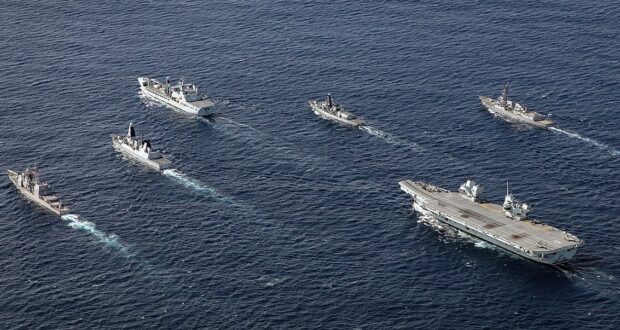9 June, 2021
The UK House of Commons Defence Committee has published written evidence submitted to it by the HSC as part of its ‘The Navy: purpose and procurement’ inquiry. The inquiry seeks to assess the threats and standing commitments the Navy is likely to face, as well as specific issues in equipment and programmes that pose a risk to the Navy’s ability to deliver planned capabilities. The HSC’s evidence highlights that:
- The UK will continue to face ‘traditional’ naval challenges including competitor states’ submarines, anti-ship missiles launched from sea, land and air, and naval mines, as well as lower-level challenges including piracy.
- Emerging threats include a greatly enhanced ability of hostile forces to strike vessels in port, both in the UK and at forward operating bases, utilising precision strike systems including cruise missiles and uncrewed aerial vehicles (UAVs).
- Threats to seabed assets include not only data cables, but also the gas import pipelines and electricity interconnectors on which the UK depends.
- New technology is enhancing the ability of hostile actors to track Royal Navy and allied vessels on and below the surface using space, air, land and sea-based sensors.
- Technological developments ranging from UAVs to additive manufacturing are increasing the already substantial advantage an attacker holds relative to the defender.
- The UK’s opponents enjoy an ever-broadening array of attack options both above and below the warfighting threshold as a result of information, technology and communications advances.
- Falling barriers to entry for the development and acquisition of capabilities ranging from precision conventional strike systems to biological weapons will make hostile state and non-state actors more capable than ever.
- The UK must begin to consider how it might take forward its maritime priorities should US losses and post-war requirements resulting from a conflict with China limit Washington’s ability to project power globally for an extended period.
- The Royal Navy has a broad array of standing commitments and commitments to NATO.
- The UK’s pivot to the Indo-Pacific is modest, with the NATO region remaining the maritime priority.
- Addressing the threats the Royal Navy faces will require a combination of traditional platforms fitted with contemporary technology, and new systems – many of the latter will be uncrewed. Cooperation with allies serves to enhance the UK’s influence but is also necessary to cover capability gaps and shortfalls in mass.
Image: HMS Queen Elizabeth with and its carrier group in 2019 (Source: UK MOD/Open Government Licence version 1.0)
 Human Security Centre Human Rights and International Security Research
Human Security Centre Human Rights and International Security Research




